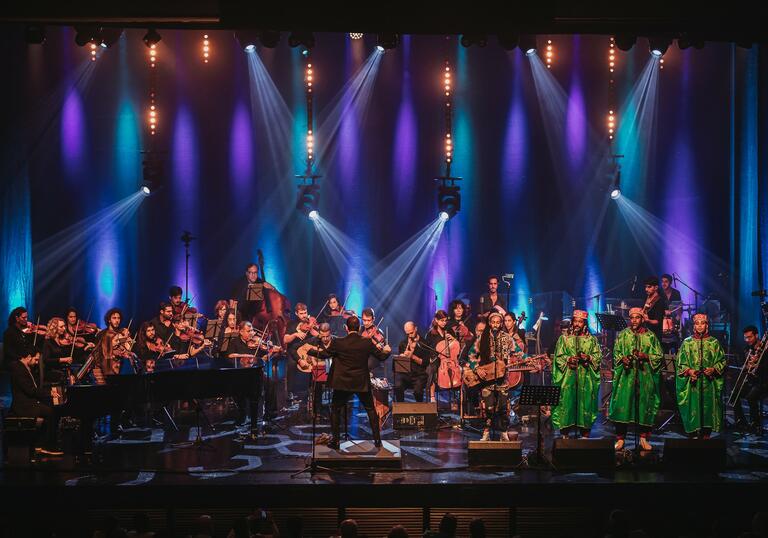Jerusalem Orchestra East & West - Digital Programme

Kevin Le Gendre talks to Jerusalem Orchestra East & West about their conception: mixing cultures and traditions to join in celebration and creation of a new musical language.
There are some striking contrasts on stage tonight. String players dressed in regulation black sit alongside vocalists clad in colourful patchwork robes and ornate hand stitched headgear. An enthralling cultural and musical encounter is taking place.
Jerusalem Orchestra East & West has joined forces with Gnawa artists from Morocco for a unique journey in sound. The destination is an ambitious one.
‘The goal is to be part of the creation of a new musical language that combines the methodologies of music from the Western world and those from the Arab and Muslim world into one,’ says Tom Cohen, ebullient director of the Jerusalem Orchestra East & West. ‘The idea is to just melt them down into one unified and organic language which can combine the harmonies of the West and the melodies of the East.’
Since its birth some 13 years ago, the Orchestra has become known for such a spirit of adventure, with its acclaimed output ranging from fresh takes on European classical music’s founding father Mozart to iconic Israeli lyricist-composer Chava Alberstein. The Orchestra’s engagement with the culture of Morocco has been a consistent one. The North African country’s population flocks to the Orchestra’s many concerts.
This latest project focuses on the unique music of the Gnawa community, descendants of West African slaves who created a vast repertoire of spiritual songs intended to bring solace, redemption and healing. Mehdi Nassouli, vocalist and virtuoso on the guimbri, the rudimentary bass instrument made of wood and camel skin, is the featured soloist, backed by jubilant singers who play chiming metal castanets that add to the dense, driving polyrhythms liable to put any audience in a state of trance.
‘Gnawa… it is the most complex simple music in the world, or the most simple complex music in the world,’ says Cohen via zoom link before cracking a broad smile. But he is not being deliberately flippant. Historically, Gnawa groups have worked with prominent American jazz artists such as legendary pianist Randy Weston, who was fascinated by their approach to rhythm and unique sense of time. For Cohen the central challenge was to find common ground between musical vocabularies that are predicated on markedly different ways of feeling the pulse of a song. It took no small amount of focus and hard graft for the Orchestra and its new guests to structure the material in such a way that made sense to all parties.
‘One of the things about Moroccan music, in general, and Gnawa music, specifically, is that the ‘one’, the downbeat, is usually in the air,’ says Cohen, voice rising in excitement. ‘The thing that makes this project a success rather than failure is that all of us now know where the ‘one’ is. We start breathing together… we are able to start understanding the polyrhythms, and the time signatures. And changes happened in rehearsal. I wrote some things in 6/8 then understood I needed to scrap them and rewrite in 9/8. At the end of the day, it is about our ability to communicate.’
In addition to Mehdi Nassouli, latest of a long line of master Gnawa musicians, the other central figure in the project is the brilliant Israeli pianist Omri Mor. Known for his work with renowned jazz bassist-vocalist Avishai Cohen, Mor is fully conversant with Gnawa music and helped shape the arrangements of a repertoire that comprises both traditional songs and new pieces by Nassouli that reflect his life as a modern Moroccan artist, who, despite his deep roots in tradition, has also embraced a wide range of new music. In any case, Israeli audiences took him to their hearts last June when Nassouli toured the country with the Orchestra. During the month he spent in Tel Aviv he became an inseparable part of the city’s bustling nightlife. ‘He and the other Gnawas arrived at clubs every night at 1am,’ Cohen recalls. ‘All of Israel’s biggest musicians would come. It made a huge impact, then we toured internationally.’
In fact, the reaction to Nassouli’s presence and his spontaneous interaction with local players made it clear to Cohen that a substantial creative bond and heartfelt empathy were developing between the Gnawas and the Orchestra. The shared vision and common musical language have been integral to the success of the project, which has left Cohen more than excited for every future performance, especially tonight’s.
‘With this concert at the Barbican... it shows the power diversity can give us,’ he says with a broad smile. ‘I hope it will be one of the best shows the Barbican has seen.’
Produced by the Barbican.
This concert is put on in collaboration with the Embassy of Israel in the UK and in association with JMI - Jewish Music Institute.
Details
Performers
Tom Cohen artistic director, chief conductor
Mehdi Nassouli lead vocals, gimbri, ghaita
Koyos choir and qraqeb
Omri Mor piano
Jerusalem Orchestra East & West
